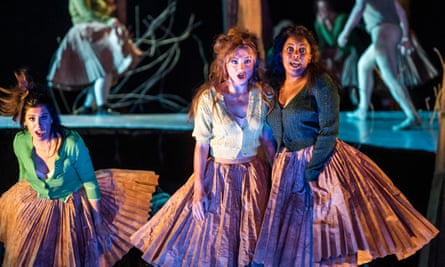Vuvu Mpofu had never heard opera until, aged 15, she was overwhelmed by a Mozart aria at a school concert. In her home town of Port Elizabeth, South Africa, there were no opera teachers, the library had only one book on the subject, and her classmates were scornful of her interest. But Mpofu overcame all these hurdles: she taught herself to sing by mimicking the singers on two opera DVDs and, several years later, her talent was spotted by a voice coach.
Now, at 28, the soprano has mentors in the world’s foremost opera companies and is to appear at Glyndebourne as Gilda, daughter of the hunchback jester, in Verdi’s Rigoletto, opening on 11 October.
Stephen Langridge, artistic director of Glyndebourne, said Mpofu had a “unique” talent. “She will be a singer we will be one day be proud to have worked with,” he told the Observer. “When you look back at the people who have taken their early steps at Glyndebourne, you see that Pavarotti had his first job in the UK here. Joan Sutherland also sang for Glyndebourne … We have a good tradition of encouraging people who we think are going to go places – and then they do. Vuvu is extraordinary. [Her] vocal talent is immense … People who sing very high in the soprano range can be very impressive … She keeps a humanity and warmth in the sound.”

Mpofu has been taken aback by such accolades. It is a long way from the two DVDs – one of La Traviata and the other of The Magic Flute – she watched repeatedly as a teenager. “I come from a small town in South Africa,” she said. “I never dreamed of any of this.” Recalling the first time she watched La Traviata, she said: “It was overwhelming. I cried while I was watching it. It took my breathe away … I kept on watching, just mimicking how they sang, how they acted. That’s how I taught myself.”
Mpofu went on to audition successfully for the South African College of Music at Cape Town University, a remarkable feat for someone with no formal training. A voice coach there spotted her potential and helped her get a student loan – although she has yet to pay it off.
“We were not rich,” Mpofu said of her family, who loved singing, whether it was gospel, traditional music or choral. “I didn’t have things that other kids did … but my mum made sure that we always ate morning, afternoon and evening. At school, people didn’t bring lunches. You had money … If [mum] didn’t have it, I would just make myself bread. I was OK.”
As she didn’t have a formal music background, her initial studies were challenging, particularly as her mother died not long after she had started. Nevertheless, she went on to study for four years as an undergraduate and two years as a postgraduate.
Mpofu overcame other challenges. She was mugged by a man with a knife the day before she entered the International Hans Gabor Belvedere singing competition, opera’s “world cup”, when it was staged in Cape Town.
This was so traumatic that she nearly dropped out of the competition. But, feeling that music was “some sort of remedy”, she sang an aria from La Traviata that got her into the final. She also came third in the prestigious international Operalia competition, which is hosted by Plácido Domingo in London.
Mpofu sang with Cape Town Opera and, earlier this year, with Opera North, appearing as Pamina in The Magic Flute. The Guardian’s Tim Ashley praised her “sumptuous tone”. Last week she won Glyndebourne’s prestigious John Christie Award, given to a promising young singer to fund private study.
Glyndebourne is now relaunching its Glyndebourne Opera Cup, a major international competition, which returns in March with a renewed commitment to diversity in opera. Applications open (on 1 September), and singers will compete for a top prize of £15,000 and a guaranteed role at a leading international opera house.
Mpofu said competitions had really helped her career. The Belvedere got her noticed by Diane Zola of the Metropolitan Opera, who became one of her mentors. “Entering competitions is a way of getting yourself out there to be seen by important people,” she said. “Also, it builds confidence.”
